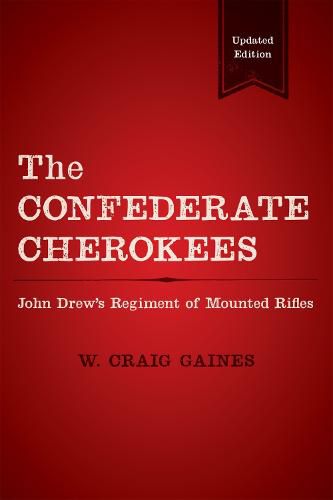Readings Newsletter
Become a Readings Member to make your shopping experience even easier.
Sign in or sign up for free!
You’re not far away from qualifying for FREE standard shipping within Australia
You’ve qualified for FREE standard shipping within Australia
The cart is loading…






This title is printed to order. This book may have been self-published. If so, we cannot guarantee the quality of the content. In the main most books will have gone through the editing process however some may not. We therefore suggest that you be aware of this before ordering this book. If in doubt check either the author or publisher’s details as we are unable to accept any returns unless they are faulty. Please contact us if you have any questions.
Although many Indian nations fought in the Civil War, general history often underrepresents the role of Native Americans in the conflict. Indian nations did, in fact, suffer a higher percentage of casualties than any Union or Confederate state, and the war almost destroyed the Cherokee Nation. In The Confederate Cherokees, W. Craig Gaines provides an absorbing account of the Cherokees’ involvement in the early years of the Civil War, focusing in particular on the actions of one group, John Drew’s Regiment of Mounted Rifles.
By the time the Civil War began, internal political dissension tore at the solidarity of the Cherokee tribe and a simmering thirty-year-old blood feud threatened to drive an even deeper divide. Entry into the war on the Confederate side intensified these intratribal tensions and ultimately two distinct factions emerged. One faction, loyal to Chief John Ross and led by John Drew- Ross’s nephew by marriage- formed a regiment. Another unit rallied around Ross’s rival, Stand Watie. The Watie regiment was largely pro-Confederate, whereas many of Drew’s soldiers, though fighting for the Confederate cause, secretly allied with a pro-Union, antislavery society known as the Keetoowahs. They had little sympathy for the southern whites, who had driven them from their ancestral homelands in Alabama, Georgia, North Carolina, Kentucky, and Tennessee. Drew’s regiment nonetheless earned a degree of infamy during the Battle of Pea Ridge, in Arkansas, for scalping Union soldiers.
Gaines unfolds the history of Drew’s regiment amid a larger narrative of military events within the Indian Territory. United action, as he shows, proved almost impossible because of continuing factionalism within the tribes and the desertion of many Native Americans to the Union forces. Indeed, Drew’s regiment, effectively disbanded by mid-1862, bears the distinction of being the only Confederate regiment to lose almost its entire membership through desertion to the Union ranks.
$9.00 standard shipping within Australia
FREE standard shipping within Australia for orders over $100.00
Express & International shipping calculated at checkout
This title is printed to order. This book may have been self-published. If so, we cannot guarantee the quality of the content. In the main most books will have gone through the editing process however some may not. We therefore suggest that you be aware of this before ordering this book. If in doubt check either the author or publisher’s details as we are unable to accept any returns unless they are faulty. Please contact us if you have any questions.
Although many Indian nations fought in the Civil War, general history often underrepresents the role of Native Americans in the conflict. Indian nations did, in fact, suffer a higher percentage of casualties than any Union or Confederate state, and the war almost destroyed the Cherokee Nation. In The Confederate Cherokees, W. Craig Gaines provides an absorbing account of the Cherokees’ involvement in the early years of the Civil War, focusing in particular on the actions of one group, John Drew’s Regiment of Mounted Rifles.
By the time the Civil War began, internal political dissension tore at the solidarity of the Cherokee tribe and a simmering thirty-year-old blood feud threatened to drive an even deeper divide. Entry into the war on the Confederate side intensified these intratribal tensions and ultimately two distinct factions emerged. One faction, loyal to Chief John Ross and led by John Drew- Ross’s nephew by marriage- formed a regiment. Another unit rallied around Ross’s rival, Stand Watie. The Watie regiment was largely pro-Confederate, whereas many of Drew’s soldiers, though fighting for the Confederate cause, secretly allied with a pro-Union, antislavery society known as the Keetoowahs. They had little sympathy for the southern whites, who had driven them from their ancestral homelands in Alabama, Georgia, North Carolina, Kentucky, and Tennessee. Drew’s regiment nonetheless earned a degree of infamy during the Battle of Pea Ridge, in Arkansas, for scalping Union soldiers.
Gaines unfolds the history of Drew’s regiment amid a larger narrative of military events within the Indian Territory. United action, as he shows, proved almost impossible because of continuing factionalism within the tribes and the desertion of many Native Americans to the Union forces. Indeed, Drew’s regiment, effectively disbanded by mid-1862, bears the distinction of being the only Confederate regiment to lose almost its entire membership through desertion to the Union ranks.